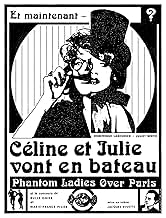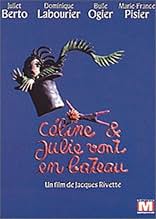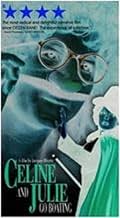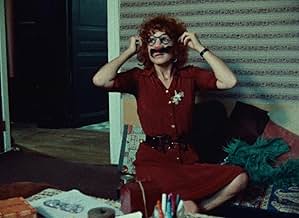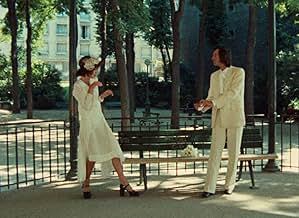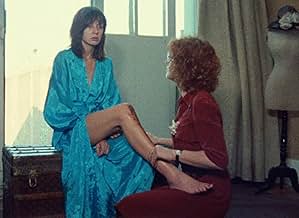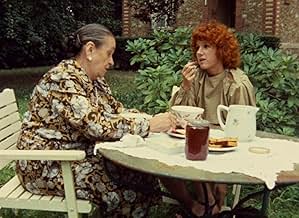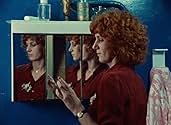Céline e Julie Vão de Barco
Título original: Céline et Julie vont en bateau : Phantom Ladies Over Paris
AVALIAÇÃO DA IMDb
7,2/10
6,8 mil
SUA AVALIAÇÃO
Um par de moças, misteriosamente conectadas, descobrem que suas vidas cotidianas são prejudicadas por um estranho melodrama íntimo, que se desenrola em uma realidade paralela alucinante.Um par de moças, misteriosamente conectadas, descobrem que suas vidas cotidianas são prejudicadas por um estranho melodrama íntimo, que se desenrola em uma realidade paralela alucinante.Um par de moças, misteriosamente conectadas, descobrem que suas vidas cotidianas são prejudicadas por um estranho melodrama íntimo, que se desenrola em uma realidade paralela alucinante.
- Direção
- Roteiristas
- Artistas
- Prêmios
- 1 vitória no total
Jean-Claude Biette
- Spectateur au cabaret
- (não creditado)
Jacques Bontemps
- Lecteur à la bibliothèque
- (não creditado)
Michel Caen
- Spectateur au cabaret
- (não creditado)
Avaliações em destaque
I recommend people read "Excruciating" (federovsky, 8/30/12) and "Much Ado About Nothing" (Milan, 4/15/2012) if they want to know what they are in store for. "Celine and Julie Go Boating" is difficult, frustrating and over long. However, it is also the kind of film that after seeing it, you wonder what other people have to say about it.
I didn't enjoy it much. Visually, it is not terribly special. The relationship between the two women and the "haunted house" is what keeps us watching, but the scenes come very slowly.
Several people have said it unfolds like a dream. Others have pointed out the lesbian/feminist side to it. Another possibility is that the two women represent two personalities of a schizophrenic nurse who committed an unspeakable crime. That would explain the repetitive cutting between one woman as the nurse and then her counterpart switching in. The two sides of the same madwoman angle possibly explains why the story includes the woman who is a performance amateur subbing for the experienced magician.
Between "Celine" (Juliet Berto) and "Julie" (Dominique Labourier), I think Labourier is the strongest here. Labourier has a lot of charisma; too bad Rivette has her often just laughing directly into the camera.
The characters in the "haunted house" are interesting. Marie-France Pisier is a favorite of mine, and she is very mysterious here.
If the scenes didn't unfold so sluggishly, and if the narrative were tighter, I think it would have been great. Unfortunately, it is too much work to recommend.
I didn't enjoy it much. Visually, it is not terribly special. The relationship between the two women and the "haunted house" is what keeps us watching, but the scenes come very slowly.
Several people have said it unfolds like a dream. Others have pointed out the lesbian/feminist side to it. Another possibility is that the two women represent two personalities of a schizophrenic nurse who committed an unspeakable crime. That would explain the repetitive cutting between one woman as the nurse and then her counterpart switching in. The two sides of the same madwoman angle possibly explains why the story includes the woman who is a performance amateur subbing for the experienced magician.
Between "Celine" (Juliet Berto) and "Julie" (Dominique Labourier), I think Labourier is the strongest here. Labourier has a lot of charisma; too bad Rivette has her often just laughing directly into the camera.
The characters in the "haunted house" are interesting. Marie-France Pisier is a favorite of mine, and she is very mysterious here.
If the scenes didn't unfold so sluggishly, and if the narrative were tighter, I think it would have been great. Unfortunately, it is too much work to recommend.
10EdgarST
I saw "Céline et Julie vont en bateau" a few years after watching "3 Women" and Claudia Weill's "Girlfriends." The next day I saw it again, and then again and again... This was a time when I was very interested in the depiction of modern women in films: some were quite original and revealing, and this was indeed one of them, dealing with the creative process, and women's imagination. Made in 1974, it had a similar origin as that of "3 Women", in which the female cast (Juliet Berto, Dominique Labourier, Bulle Ogier, and Marie-France Pisier) worked with director Rivette and writer Eduardo de Gregorio on the script. It is also a story of female bonding and solidarity, but instead of relying on dreams, it uses magic and literary sources, Lewis Carroll's "Alice in Wonderland" being the first to come to mind. Librarian Julie (Labourier) becomes intrigued by weird rabbit-like magician Céline (Berto), but soon one is after the other. They become friends (or sort of) and exchange roles in each other's life, but nobody seems to notice the difference. Then Céline reveals she frequently goes inside an old house where a melodrama is repeated on and on (based on Henry James' "The Romance of Certain Old Clothes" and "The Other House"), enacted by two women (Ogier, Pisier) who are both in love with a very pale man (filmmaker Barbet Schroeder.) In the old house there is also a little girl (Nathalie Asnar) who is in danger, so Céline and Julie become the "phantom ladies" of the title (including Fantômas outfits) to rescue her. This post-modern movie is a puzzle, and the audience is intellectually involved in the making. Critics went crazy and called it "the most important film made since 'Citizen Kane'." I don't know if it is, but I love it: it is funny, demanding, entertaining, and sometimes boring, in the best tradition of Satie's repetitive "Vexations". Reworked as "Desperately Seeking Susan", without acknowledging it.
Praised by the critics as "delicate , mysterious, and exiting", "an original and entertaining metaphor for film-watching and, perhaps, film history", and named "The most radical and delightful narrative film since Citizen Kane! The experience of a lifetime" by New York's critic David Thompson, "Celine and Julie Go Boating" (1974) is all of the above but first of all it is incredible fun to watch. This magic candy of a movie tells the story (or rather plays with the story) of two friends, Julie, a librarian and Celine, a magician. The film starts one sunny summer day in Paris when Julie follows running through the park and losing her stuff all over (a scarf, a shoe
) Celine exactly like another girl in the English country side one sunny summer day had followed a White Rabbit into a world of her imagination. Two girls became friends and soon with the help of a magic memory-inducing candy, they both will be the observers and participants in a bizarre soap-opera like drama that takes place in a mysterious house. It involves two stunningly beautiful women, a blonde and a brunette, who are in love with the same man. The man is a widower with a young daughter who had promised his wife that he would not remarry as long as their daughter is alive. When the blonde and the brunette become desperate enough to try to do something about the situation, it is up to Julie and Celine to come up with the plan and to rescue the young girl. Will they go boating? Well, you will have to stay with them for all 193 minutes to find out. Yes, Rivette takes his time but his movie never seems slow or boring. Playful yet complicated, mad and funny, "Celine and Julie" is a magic movie. It grabbed me from the opening scene - which is of course the opening chapter of "Alice in Wonderland" - and it never let go. Buniel would love this movie, I think. It also reminds me of "Mullholand Dr" and even "Persona" but in the absolutely different mode. Simply DELIGHTFUL.
Some directors use less than 2% of their footage in the final cut but Rivette must have used 92% of his to make this - perhaps he used absolutely everything, including, apparently, out-takes. Tedium sometimes has a point, but not here. This is annoying-tedium for every scene seems calculated to test our patience. There's no humour or verve or flair or great lines or classic scenes, not even sad attempts at those things, only a forced drollerie that falls flat in every scene There is endless silly giggling, scenes such as those in the nightclub that are just tiresome to watch, fantasy sequences that are presumably meant to look like a corny TV sitcom, but, lacking any scrap of humour, the point is entirely lost and the actors flounder. The girls try far too hard to be cute, and only succeed in being cloying. And I'm waiting for a director to grasp this simple truth: that giving the actors free rein does not make the action more spontaneous and natural, only more strangulated, more self-conscious, more unnatural and cringe-inducing than if they were following a consistent and meticulous script.
After a while you realise Rivette is just playing silly buggers. Fluffed lines are left in, characters glance inadvertently-deliberately at the camera. Rivette will be saying: 'Regard, c'est un film that is pas un film, we're deliberatement toying avec your illusions'. I'm saying: Vous etes un wankeur.
Why three hours? A Senses of Cinema article is eager to explain: 'The tradition of rigid adherence to the 90 minute to 2-hour time frame, enforced by the laws of free market capitalism, is exploded by Rivette. As a filmmaker, Rivette refuses to confine himself to these arbitrary lengths, or to the even more arbitrary, if unspoken, rules about demands on subject matter and mise-en-scène in films of epic length. Instead, Rivette extends the lengths of his films to a point beyond necessity, where it is understood that the film's length in and of itself is a statement about the system he works in and rebels against.' 3 hours simply to defy (capitalistic??) convention? Wankeur.
The audience are the dupes here - poked fun at for trying to apply reality to what is self-consciously only a film. This is not New Wave. I'm gazetting Rivette as a hanger-on, a copyist. He wants to shoot in the style of Rohmer, but he hasn't got Rohmer's indefinable deftness. He wants to break the rules like Godard but he has not got Godard's indefinable style or charisma. He wants to say something meaningful in an offhand way, like Truffaut, but he hasn't got that indefinable intellect for it. All he can do is try. You can feel him trying. It boils down to a single lame joke that isn't funny and a single idea that isn't clever. Three hours of film-flam, tiresome beyond belief.
After a while you realise Rivette is just playing silly buggers. Fluffed lines are left in, characters glance inadvertently-deliberately at the camera. Rivette will be saying: 'Regard, c'est un film that is pas un film, we're deliberatement toying avec your illusions'. I'm saying: Vous etes un wankeur.
Why three hours? A Senses of Cinema article is eager to explain: 'The tradition of rigid adherence to the 90 minute to 2-hour time frame, enforced by the laws of free market capitalism, is exploded by Rivette. As a filmmaker, Rivette refuses to confine himself to these arbitrary lengths, or to the even more arbitrary, if unspoken, rules about demands on subject matter and mise-en-scène in films of epic length. Instead, Rivette extends the lengths of his films to a point beyond necessity, where it is understood that the film's length in and of itself is a statement about the system he works in and rebels against.' 3 hours simply to defy (capitalistic??) convention? Wankeur.
The audience are the dupes here - poked fun at for trying to apply reality to what is self-consciously only a film. This is not New Wave. I'm gazetting Rivette as a hanger-on, a copyist. He wants to shoot in the style of Rohmer, but he hasn't got Rohmer's indefinable deftness. He wants to break the rules like Godard but he has not got Godard's indefinable style or charisma. He wants to say something meaningful in an offhand way, like Truffaut, but he hasn't got that indefinable intellect for it. All he can do is try. You can feel him trying. It boils down to a single lame joke that isn't funny and a single idea that isn't clever. Three hours of film-flam, tiresome beyond belief.
When I first saw this film I was amazed by it. The freshness and the imagination of the two protagonists, the way in which it recognised the magic (real magic) of Paris, and the strange parallel worlds it created in which Celine and Julie are both deeply involved and creating, and then acting, their own parts. On re-viewing it more than ten years later though, I was surprised to be a little disappointed. The magic is so thin. Celine and Julie have taken the, very conscious and explicit, decision not to grow up, and as a result, although they are beautiful adults, their world is a child's world. Their imagination is child-like, in its imagery (sweets, plastic "dinosaur eyes", rather thin puns), in its chosen surroundings (cases full of dolls), its disasters (a grazed knee), its aims (largely disruption of the concerns of surrounding adults), in its ridiculing of sexuality and its steadfast refusal to admit that fantasy is sometimes, necessarily, dangerous. Without any danger or any desperation, it seemed on second visit a charming but slightly futile game.
Você sabia?
- CuriosidadesIt is a misconception that most of the film was improvised by the actors. Jacques Rivette provided structure but did not let his actors "go wild", instead he let them write. A single scene was improvised, where Celine, played by Julie Berto, brags to her associates about her rich American friend. The rest of the scenes where shot from scripted material, mostly thanks to participating actors. The film is collaboration by several authors, including actors Berto, Labourier, Ogier and Pisier. Rivette's involvement in the writing was to give structure to all the contributions, tightening things up.
- Erros de gravaçãoThe last time Julie receives the cigarette from under the table, it is bigger than it was when her colleague handed it to her.
- ConexõesFeatured in Berlin Chamissoplatz (1980)
Principais escolhas
Faça login para avaliar e ver a lista de recomendações personalizadas
- How long is Celine and Julie Go Boating?Fornecido pela Alexa
Detalhes
Bilheteria
- Faturamento bruto nos EUA e Canadá
- US$ 31.452
- Fim de semana de estreia nos EUA e Canadá
- US$ 5.624
- 6 de mai. de 2012
- Faturamento bruto mundial
- US$ 31.452
- Tempo de duração3 horas 13 minutos
- Mixagem de som
- Proporção
- 1.37 : 1
Contribua para esta página
Sugerir uma alteração ou adicionar conteúdo ausente

Principal brecha
By what name was Céline e Julie Vão de Barco (1974) officially released in India in English?
Responda

